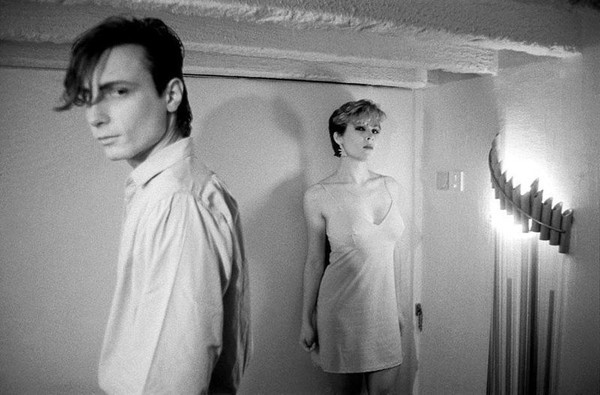5.
The New Wave
If the 1960s saw electrification and the beginnings of Balkan rock beyond simple repertory repetition, as well as an attempt on the part of Yugoslav youth to take an active part in the political direction of the country, and the ‘70s saw the full melding of folk and Western European forms as the youth turned away from active political life, the dawning of the ‘80s saw the realization of a new mindset and artistry that rewrote the rules for everything: The New Wave.
Former music critic and award-winning Novelist David Albahari, wrote, looking back at the dawn of the new cultural era from the present day, “Rock ‘n roll until then had a minor status in Yugoslav culture, and to mention rock together with Andrić or Kiš represented, at the very least, terrible blasphemy. The New Wave changed that overnight…the most significant aspect, at least for me, [of the new wave] was represented by the feeling that the parallel appearances of the scenes of Zagreb, Belgrade, Ljubljana, Skopje, and other places would contribute to a new unity.” (Ivo Andrić was Nobel Prize-winning author of The Bridge on the Drina, a historical novel spanning four centuries of a bridge constructed by the Ottomans in Bosnia-Herzegovina. Danilo Kiš is the famous author of the Jorge Luis Borges-reminiscent historical novel A Tomb for Boris Davidovich.)
The new wave was sprung upon the people of Yugoslavia with the release of the compilation LP “Paket aranžman”, translated as Package Tour. It contained songs from three bands of the burgeoning Belgrade punk and New Wave scene, members of which would go on to form still other even more influential bands in the coming years. The groups included were: Šarlo akrobata, Idoli, and Električni orgazam. We will discuss some of these, among others, in the sections that follow.
Električni Orgazam
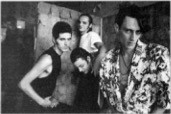
Električni Orgazam (Janjatović, 80)
Električni Orgazam was formed in January of 1980 in Belgrade by Srđan Gojković Gile, drummer Ljubomir Jovanović Jovec, and organist Ljubomir Đukić. At their third performance at the Subotica youth festival in summer of that year they scandalized the crowd with an energetic performance resulting in, among other things, a broken microphone and the destruction of the stage lighting. Among the Paket Aranžman bands, they appeared to be most dedicated to a sensationally destructive punk persona. Despite this, of the three bands contributing to that compilation, they were the first to record and release their own debut album.
Punk made a circuitous entrance into Yugoslav life. Having already exploded abroad in the UK and the US, made famous by bands like The Sex Pistols, The Damned, and the Ramones, it entered into the Yugoslav mainstream more as a fashion than as an ethos. The torn clothes and leather jackets that signified disdain for mainstream values that were meant to shock the sensibilities of polite society abroad were brought back to Yugoslavia as haute couture by the privileged children of high-ranking party members and factory management who could afford to travel to the UK and elsewhere. Električni Orgazam rehabilitated the punk image by criticizing the trendiness of punk and bringing it more in line with its roots of non-comformity and class struggle. Their single “The Golden Parrot” sums up this critique:
tata placa sve racune
zlatni papagaj
jer mi smo snobovi (REF)
Mi volimo zenske fine
nasminkane, doterane
uredno smo pocesljani
obuceni, obuveni
Mi nosimo skupo perje
ispeglano, mirisljavo
gnusamo se GSP-a
kolima se brze stize
REF
Nase glave prazne jesu
ali ko jos zato mari
jer lova je najvaznija
i drugo nas ne zanima
U Rimu se oblacimo
i imamo Diner’s karte
krem drustvo je nasa klasa
svi ostali manje vrede
REF
Pankere ne podnosimo
ni smrdljive hipije
mi sterilni mozda jesmo
ali krivi za to nismo
Jer nase tate, nase mame
parama nas zasipaju
i neka za nas drugi misle
mi sposobni za to nismo
Daddy pays all the bills Golden parrot
Because all of us are snobs
(REFRAIN)
We like fine women
made up, dolled up
we’re well-combed,
well-dressed, well-shod
We wear expensive feathers
ironed and scented
we hate public transit
we get there faster by car
REFRAIN
Our heads are empty
but who still cares about that?
because cash is the most important thing and nothing else interests us
We get our clothes in Rome
and have Diners cards
The cream of society is our class
Everyone else is worth less
REFRAIN
We don’t tolerate punks
or smelly hippies
We might be sterile
but we’re not to blame for that
for our daddies and mommies shower us with money
and someone else thinks for us
we’re not good at that
Idoli
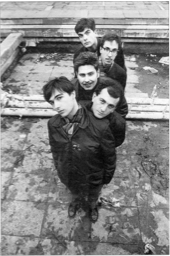
Idoli (Janjatović, 102)
Idoli (The Idols) were a band of the Belgrade New Wave that played with nostalgia and parodic appearances. In 1978 the late guitarist and vocalist Vlada Divljan, bassist Zdenko Kolar, keyboardist Dragan Mitrić, drummer Kokan Popović, and saxophonist Bora Atić formed the band Merilin, later renamed Zvuk ulice, which translates to “Sound of the Street.” They participated in the 1978 Zaječar Gitarijada music festival in eastern Serbia, as well as the BOOM festival in Novi Sad in Serbia's Vojvodina region. Neither appearance attracted enough interest to secure a recording deal. Consequently, the following year they stopped playing under that name.
In 1979 graffiti referencing a group called Dečaci (The Boys) appeared in Belgrade following the printing of a photograph of would-be members of Idoli in the youth press with the caption “Boys emancipate women.” The corresponding graffiti that appeared in Belgrade included the messages “Margita is a boy,” “Boys don’t cry”, and “Srđan, be a man!” Idoli became the official name of the band in March of 1980, and its members included Vlada Divljan and Kolar, drummer Boža Jovanović, and composers and vocalists Srđan Šaper and Nebojša Kristić. All were friends from elementary school or high school. In June 1980 they held their first concert in the storied Belgrade Student Cultural Center (SKC), and released their first single, including the groundbreaking “Retko te vidjam sa devojkama” (“I Rarely See You with Girls”) that same year. In 1981 Merilin and Zvuk ulice drummer Kokan Popović returned to the group. By presenting the appearance of a well-dressed and conventionally straight- laced, doo-wop reminiscent “Vocal-Instrumental Group” (vokalni-instrumentalni sastav), or VIS, the official nomenclature for professional groups licensed to perform publically in Socialist Yugoslavia, they presented an image redolent of a campy ‘50s-‘60s wholesomeness while subversively using mainstream channels to introduce such themes into the popular consciousness as homosexuality, religion, nationalism, and Russian- Yugoslav/American-Yugoslav relations.
Retko te vidjam sa devojkama Ipak nikad nisi sam
Oko tebe su decaci Fini su al' ipak znaj
Glasine se brzo sire A kad puknu tu je kraj
Retko me vidjas sa devojkama A vidas me svaki dan
Retko me vidjas sa devojkama Ipak nikad nisam sam
Devojke su meni drage Volim ih al' ipak znaj
Snalazim se tesko s' njima Jedan susret tu je kraj
Veruj mi Veruj mi
Retko te vidjam sa devojkama A vidjam te svaki dan
Retko te vidjam sa devojkama Ipak nikada nisi sam
Oko tebe su decaci Fini su al' ipak znaj
Glasine se brzo sire A kad puknu tu je kraj
Veruj mi Veruj mi
I rarely see you with girls although you're never alone
Boys are all around you
They are fine, but you know rumors spread quickly
and when they burst, it's the end
You rarely see me with girls but you see me every day
You rarely see me with girls although I'm never alone
I find girls sweet
I like them, but you know
It's hard to manage with them One meeting and it ends here
Believe me Believe me
I rarely see you with girls But I see you every day
I rarely see you with girls although you're never alone
Boys are all around you
They're fine, but you know
rumors spread quickly
and when they break, that's the end
Believe me, Believe me
Denis i Denis
No overview of the New Wave in the Balkans would be complete without mentioning at least one example of its concurrence with the synthesizer-pop trend then dominating the world. Denis i Denis, of Rijeka, Croatia, were a duo of keyboardist, producer, and singer Davor Tolja and singer Marina Peražić. They traded in cutting-edge electronic music with exaggerated sexuality, exploring the influence of new technology on everyday life while titillating fans with Peražić’s breathless delivery. An example of this is her performance on 1982’s hit Program tvog kompjutera (a program on your computer). The listener is called to a playful awareness of the novelty of the synthesizer sound with the lyrics referencing computer technology. This is combined with the story of a cat-and-mouse flirtation between a man and a woman on a date. There is an overt attempt to humanize the technology that is changing the relations between people, with the singer, Marina Peražić’s gasps on cue with her lyrics’ reference to losing her breath, reacting to being in her lover’s embrace, etc., that solidly grounds the new form of synthesized new wave music in with the Balkan tradition of verbal playfulness and joking flirtation. In this song, the machine becomes human through metaphor, and the joining of the vocals of Tolja and Peražić in the ending refrains emphasize a will toward freedom by the two lovers instead of submission to the dictates of technology.
neka jaka želja opija mi strah
koji korak još i kraj ulice
Srce divlje lupa, želim te
ja ti brišem suze vodim te u stan
dok polako pogled moj spusta se
Ref.
Sada pratim ritam tvoj
ovu pjesmu novi broj
ako želiš bit ću ja
program tvog kompjutera
Mrak je, tražim svjetlo, ti spremaš ključ
u prazninu tonem tvoj je dodir vruć
dok mi diraš kosu ja gledam te
Ref. 3x
You follow me, I run and lose my breath
Some powerful desire intoxicating my fear
That there’s just one more step to the end of the street
Man:
My heart beats wildly, I want you
I wipe your tears away and walk you home
While my gaze slowly drops
Refrain
Now I follow your rhythm
This song, this new number
If you want it, I will be
A program on your machine
Woman:
It’s dark and I look for the light, you get out your key
In the emptiness I sink, your touch is hot
While you touch my skin I look on you
Refrain (man and woman)
Listen to music by Denis & Denis
Program tvog kompjutera SPOTIFY
Zana
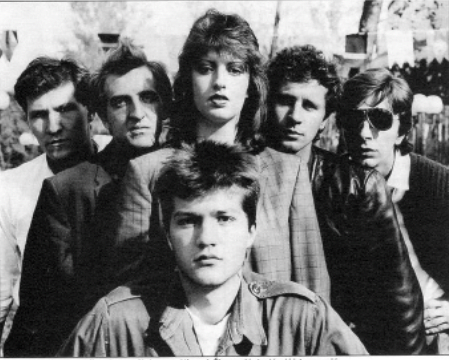
Zana (Janjatović, 247)
Zana was formed in 1976 by gymnasium schoolmates Radovan Jovićević and Zoran Živanović Kikamac under the name “Suton,” meaning twilight. Radovan brought his girlfriend Zana Nimani into the group, and they began to play under the name Zana in 1979. “Dodirni mi kolena” (“Touch my knees”) is the title track of the Belgrade group Zana’s second LP from 1982, released on the label Jugoton. On it, the group plays with the pop sensibility of ABBA to engage in a humorous send-up of consumerism. It was recorded in Sweden to exacting standards that led to spectacular success, but the band tended to disappoint audiences with their ability to reproduce the recording live. This hit song, with its endless list of transactional demands, played up the strange relationship between consumerism and intimate relationships that were appearing in the context of the development of social classes in a previously largely egalitarian socialist society to hilarious effect.
iz tvoje lepe lude plave glavice
ne budi dete
Obuci papuče, dodaj mi jastuče
nežno me zagrli, I ponašaj se prirodno
skuvaj mi kafu, napravi sendvič Lepo ugosti I zadovolji me
Hej, moja dušice, ostavi lutkice koje te jure I samo ti dosađuju
ne budi dete
kupi mi haljine, srebrne lančiče crvene maline, I kartu do Amerike
znamo se skoro, već 10 dana daj mi svoj auto, I ključ od stana
Hej, na sveže mleko miriše dan ptice pevaju na sav glas
jutro njiše vetar, dodirni mi kolena to bi baš volela
Hej, plavo nebo žuri u stan
žuti leptir mazi moj vrat
jutro njiše vetar, dodirni mi kolena to bi baš volela
Put on your slippers, give me a little cushion Tenderly embrace me and act natural
Brew me coffee, make me a sandwich Entertain me and satisfy me well
Hey, my little one, leave the dolls That chase you and only bore you Don’t be a child
Buy me dresses, silver chains
Red berries and a ticket to America
We’ve already known each other almost 10 days Give me your car, and the key to your apartment
Hey, the day smells like fresh milk
Birds sing at the top of their lungs
The wind shakes the morning, touch my knees
I'd really love that
Hey, the blue sky hurries into the apartment
A yellow butterfly caresses my neck
The wind shakes the morning, touch my knees
I'd really love that
Ekatarina Velika
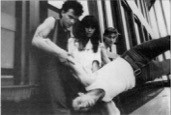
Ekatarina Velika (Janjatović, 78)
Ekatarina Velika was formed as Katarina II in February of 1982 and was one of the most popular acts in the territory of the former Yugoslavia until the death of singer and guitarist Milan Mladenović of pancreatic cancer in 1994. By 2000 all of rest of the band’s active members save for one had died as the result of the heroin and AIDS epidemic that had devastated the Yugoslav New Wave youth cultural scene. By 2000 the only surviving full-time member was keyboardist Margita Stefanović. Croatian rock critic Ante Perković, as part of his book-length essay on the impact of the New Wave youth culture, Sedma republika: Pop kultura u YU raspadu (The Seventh Republic: Pop Culture in the Breakup of Yugoslavia), cites a 2000 concert featuring Stefanović and other fill-in musicians performing a tribute to EKV as one of the first signs of a return to a “normal” supra-national state of things in the territory since the breakout of civil war. In his estimation, the appeal of the group had been so universal that the performance of their music represented a sign of the desired return to an important norm of civil life following the tumult of the ‘90s. Stefanovic herself succumbed to the long-term effects of heroin addiction and HIV in 2002 at the age of 43, her country and most of her closest friends already gone.
Their lyrics allude to the possibility of a social order that is not dependent on political or geographical boundaries. In these songs, they emphasize the importance of a supra-national moral state organized around a utopian vision of inclusiveness and the clarity that remains after political obfuscation is removed from play.
Ovo je zemlja za sve naše ljude
Ovo je kuća za nas
Ovo je kuća za svu našu decu
Pogledaj me, o pogledaj me
Očima deteta
U zemlji vidim spas
Iz sna me budi glas koji prepoznajem
Dok grane miluju naša tela
Dok senke prave pokrov za nas
Pogledaj me, o pogledaj me
Očima deteta
Čujem - vrati se
Čujem – ostani
Čujem - vrati se
Dozvoli mi
Čujem - vrati se
Čujem – ostani
Čujem - vrati se
Oprosti mi
U svakom porazu ja sam video deo slobode I kad je gotovo
Za mene, znaj, tek tad je počelo
Pogledaj me, o pogledaj me
Očima deteta
Čujem - vrati se
Čujem – ostani
Čujem - vrati se
Dozvoli mi
Čujem - vrati se
Čujem – ostani
Čujem - vrati se
Ne idi, ne idi, ne!
This is a world for all of our people
This is a home for us
This is a home for all of our children
Look at me, o look at me
with the eyes of children
In the world I see salvation
A voice I recognize rouses me from my dreams
While branches caress our bodies
While the shadows make a shelter for us
Look at me, o look at me
with the eyes of children
I hear - return
I hear - remain
I hear - return
Let me
I hear - return
I hear - remain
I hear - return
Forgive me
In every defeat I saw freedom
And when it’s over
for me, know that it’s only just begun Look at me, o look at me
with the eyes of children
I hear - return
I hear - remain
I hear - return
Let me
I hear - return
I hear - remain
I hear - return
Don’t go, don’t go, No!
Post-Yugoslav Panoply
A vibrant music scene continues to thrive all over the Balkan peninsula in the republics of the former Yugoslavia. This tradition is carried on by independent rock labels and bands such as Belgrade’s Repetitor, brash and sexy synth-pop acts like Zagreb’s Lollobrigida, moody urban rock with slick production like Belgrade’s Autopark, hip hop, and confrontational punk like Bosnia’s Damir Avdić. This is not even to mention the thriving techno music scene that crosses borders throughout the region, uniting people who may officially speak different languages, but who can all dance to the same rhythm.

